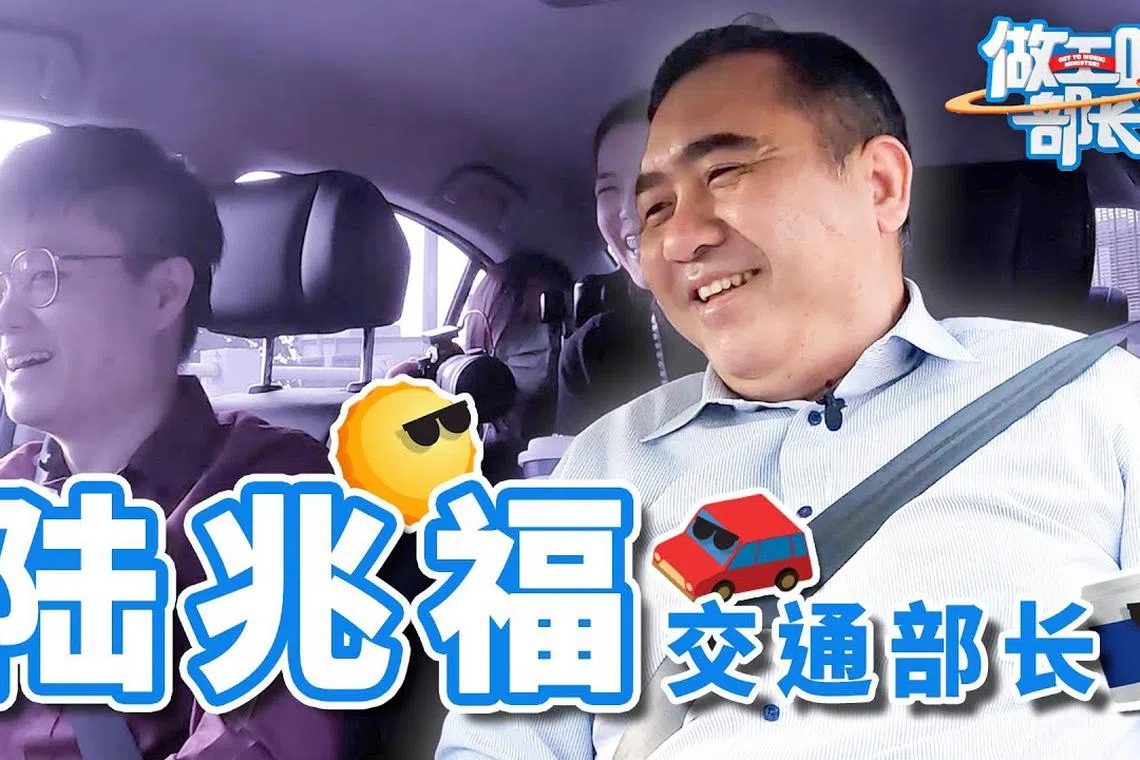Young Malaysians are livening up politics on YouTube
Sign up now: Get insights on the biggest stories in Malaysia

BBK Network's Lucas Lee interviewed Malaysian Transport Minister Anthony Loke while driving him to Parliament.
PHOTO: BBK NETWORK/FACEBOOK
When Malaysian YouTuber Chuah Chee Xian, better known as Sai, invited some of his country’s political leaders to appear on his irreverent infotainment show Between Two Laksa, he was not sure how his ideas would be received.
To his delight, a few politicians gamely agreed to be interviewed in a mock antagonistic format inspired by US talk show Between Two Ferns, where the obnoxious host and his celebrity guests would trade barbs and thinly veiled insults.
Sai, 29, has so far “roasted” former youth and sports minister Syed Saddiq Abdul Rahman
Sometimes, Sai’s prickly questions are met with awkward silence; other times, with a sharp retort. Nothing about their interactions look rehearsed.
Tens of thousands of viewers have watched these raw, hilarious and mildly offensive videos, with some commenting that the show is “better than TV news”.
The Syed Saddiq episode has more than 145,000 views, while the one featuring Lim has more than 90,000 views.
Sai is among a growing number of young content creators who are adding another facet to Malaysia politics through their entertaining infotainment videos, which often show the softer and less guarded side of their guests.
More politicians seem happy to be featured, especially in the lead-up to elections.
The young team behind BBK Network, another popular YouTube channel, have also been producing infotainment videos that blend comedy with politics and social affairs.
A number of political heavyweights have been featured in their recent series. In one episode, they drive Transport Minister Anthony Loke to Parliament while grilling him about the transport woes facing Malaysian commuters. In another episode, they follow Penang’s caretaker chief minister Chow Kon Yeow for a full day as the strait-laced politician went from appointment to appointment.
Mr Lucas Lee, 27, a producer-presenter of the show and stand-up comedian, told The Straits Times that his team have full control of their content, and have never been asked to avoid any line of questioning or remove any parts of the interviews.
But he added that there are politicians who did not respond to their invitations, possibly because of their reluctance to go along with the show’s format.
Ceding control
Unlike posting content on their own social media platforms, politicians who agree to put themselves on the YouTube channels of other content creators often have to be prepared to cede some control.
For one, they may be asked to perform TikTok dance moves, or they may end up on the receiving end of a prank.
Yet, many of them still see the value of joining the shows – mainly to reach younger viewers.
Mr Chong Zhemin, MP for Kampar in Perak, was in one of BBK’s episodes where he was tricked into thinking that he got all the answers wrong to a series of questions about undergraduates’ opinions.
While he was at first “puzzled” by the prank, he told ST that such creative ways of presenting current affairs should be encouraged.
“BBK is quite established. Their audience is mostly young people – it’s a bit different from our traditional base of supporters,” Mr Chong said. “By collaborating with them, we get to know young people better and get more exposure (for ourselves).”
Malaysia’s Deputy Communications and Digital Minister Teo Nie Ching said she was happy to join the show as it gave her another platform to share tips on digital literacy with a different audience.
For Mr Saddiq, who himself has a sizeable following on social media, it is important to leverage the reach of non-traditional media to deliver more “targeted” messages, especially when bigger political parties have more cash to spend on campaign advertising in traditional media.
The president of the Malaysian United Democratic Alliance (Muda) told ST: “We are the underdog of the underdogs. We are under-resourced, undermanned and because of that we have to be innovative to get our policy ideas out, and in approaching this campaign,” he said, referring to Malaysia’s state elections on Aug 12.
Having more politicians on non-traditional, non-mainstream media platforms is a positive development, said Professor Gayathry Venkiteswaran who teaches political communication at the University of Nottingham Malaysia.
“It allows for politics to be discussed in different, and creative ways,” she said. “Since the 2013 general elections, the role of social networking sites was particularly noted. Politicians and political parties realised they needed to have online engagement with voters.”
Dr Elvin Ong, an assistant professor in the Department of Political Science at the National University of Singapore, noted that political leaders in Singapore – including Law Minister K. Shanmugam and Education Minister Chan Chun Sing – have also been appearing on popular YouTube series such as The Daily Ketchup Podcast and Miss Tam Chiak’s food show Chiak Local.
He said: “I think politicians on both sides of the Causeway recognise that there is a need to engage audience beyond traditional media.”
An effective way to engage the youth is to appear alongside content creators that are popular with them, he added.
But Dr Ong also noted that there may be audience fatigue when a point of saturation is reached. “If these content creators all start hosting politicians left and right during the election season, then there is internal competition for a limited set of audiences,” he said.



